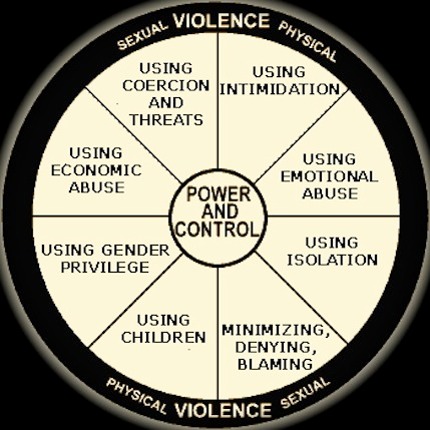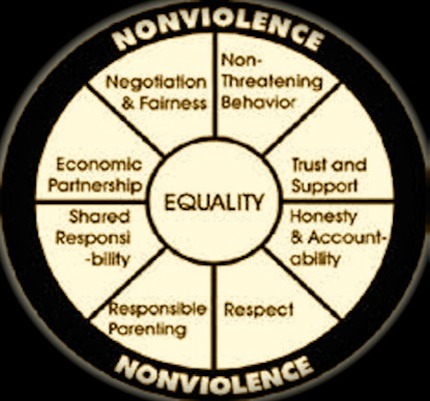
The Truth About Domestic Violence
It is a crime if someone physically hurts or threatens you. No one has the right to hurt you, even if that person is a spouse, child, boyfriend or girlfriend, parent or partner.
YOU ARE NOT RESPONSIBLE FOR THE VIOLENCE:
Batterers often blame their abusive behavior on drugs or alcohol, stress, childhood abuse, or their partner. As a result, you may have feelings of isolation, fear, shame, and hopelessness.
YOU ARE NOT ALONE:
There are people who are concerned about you and want to help. We hope this information is part of the beginning of a safe future for you and your children.
READ THE TRUTH:
I am not to blame for being beaten and abused
I have a right NOT to be abused
I am not the cause
of another's violent behavior.
I have a right to be angry over past beatings.
I do not like or want it.
I do not want my children to grow up to batter
or be battered.
I have a right to leave
this battering environment.
I have a right to be in a safe, nonviolent home.
I have a right to provide a healthy environment
for myself and my children.
I do not have to accept physical, emotional,
sexual, psychological, or financial abuse.
I have the right to make mistakes.
I have the right to believe
that I have a good memory
and can remember events.
I have the right to have a partner
who is sexually faithful.
I have the right to participate in the process
of making rules that will affect my life.
The Truth About Domestic Violence:
Domestic violence is an escalating pattern of abuse where one partner in an intimate relationship controls the other through force, intimidation, or the threat of violence. Abuse comes in many forms:
Physical:
Kicking, punching, shoving, slapping, pushing, and any other acts which hurt your body.
Sexual:
Calling you vulgar names, criticizing your body parts or sensuality, forced or pressured sexual acts, including rape.
Emotional:
Assaults against your self-esteem.
Verbal:
Name-calling, threats, put-downs.
Psychological:
Causing you to feel as if you are "going crazy".
Spiritual:
Attacking your spiritual or religious beliefs.
Financial:
Controlling and manipulating you by threatening your economic status and basic needs.
Homophobic:
Threatening to "out" you to people who do not know your sexual orientation.
Immigration:
Using your immigration status and fear of deportation to control you.
Destructive Acts:
*Actual or threatened assault of your property or pets to scare you.
* A woman is beaten every nine seconds in the United States. Domestic violence is the most under-reported crime in the country, with the actual incidence 10 times higher than is reported.
* Eighty percent of children who live in homes where domestic violence occurs witness the abuse.
* Lesbian and gay domestic violence occurs in approximately one-third of these relationships, about as often as in heterosexual relationships.
* On average, four women are murdered every day by their male partner in the U.S. According to the District Office, there were 21 deaths as a result of domestic violence in Santa Clara County in 1995.
* Women in the U.S. are in nine times more danger in their own homes than they are in the street.
* According to the U.S. Department of Justice, 95 percent of reported spousal assaults are committed by men against women. Assaults committed by women against men occur in approximately 5 to 10 percent of domestic violence matters.
* About 17 percent of women report experiencing physical or sexual violence during pregnancy.
*Battering prior to pregnancy is the primary predictor that battering will occur during pregnancy.
Domestic violence is one of the nation's best kept secrets. Myths and misunderstandings abound. Knowing the facts is an important step toward breaking the cycle of violence.
Fact:
Almost four million women are beaten in their homes every year by their male partners. Although the first violent incident may not be severe, once battering begins, it tends to increase in severity and frequency, sometimes leading to permanent injury or death. What may begin as an occasional slap or shove will turn into a pushy down the stairs, a punch in the face, or a kick in the stomach.
Fact:
Battering is not about anger or losing control; it is an intentional choice focused on maintaining power and control in the relationship. Batterers manage not to beat their bosses or terrorize their friends when they are angry.
Fact:
The batterer is responsible for the violence – not the victim. People are beaten for breaking an egg yolk while fixing breakfast, for wearing their hair a certain way, for dressing to nicely or not nicely enough, for cooking the wrong meal, or any other number of excuses. These incidents do not warrant or provoke violence. Even when you disagree, you do not deserve to be beaten. People who are battered do not want to be beaten.
Fact:
Violence does occur in same sex relationships, and the issues of power and control are similar to those found in heterosexual relationships. Homophobia allows us to trivialize the violence in same sex relationships and compounds the effects of the violence for the victim.
Fact:
Substance abuse is involved in about half of all domestic violence incidents. Although drugs or alcohol may lower a person's self-control, they do not cause violence. Batterers often use drugs or alcohol as an excuse or permission to batter and to avoid responsibility for their abuse.
Fact:
Because violence inflicted upon a woman by her partner is treated much differently than violence inflicted by a stranger, batterers are not always arrested. Traditionally, police were more likely to file a report if the offender was a stranger, rather than an intimate partner.
Fact:
Battering crosses all economic, educational, ethnic, sexual orientation, age, and racial lines in equal proportions. There is no "typical" victim.
Fact:
Batterers generally lead "normal" lives except for their unwillingness to stop their violence and controlling behavior in their intimate relationships.
People stay with abusive partners for many different reasons. By understanding these reasons, you can explore your options for living a violence-free life and avoid feelings of guilt and isolation:
* You fear you will be beaten more severely. Your batterer has threatened to find and kill or harm you, your children, and your family.
* You depend on the batterer for shelter, food, and other necessities.
* You have no one to talk to who understands and believes you.
* You believe your children need two parents, and you don't want to raise them alone.
* You want to keep the family together and live up to your religious commitment to remain with your partner.
* You fear that you won't be able to take care of yourself and your children alone.
* You want to stand by your partner and be loyal to the relationship.
* Your partner has threatened to commit suicide if you leave.
* You believe that things will get better.
* You believe that no one else will love you.
* You fear your family and friends will be ashamed of you.
* You feel ashamed, embarrassed, and humiliated and don't want anyone to know what is happening.
* You think others will believe that you are "low class" or stupid for staying as long as you already have.
* You believe that you need to be in a relationship to feel like a complete person.
* You fear that you will be deported or that your children will be taken out of the country.
* If you are in a same sex relationship, you fear that you will be "outed" or that no one will believe you.
* Your job is to make the relationship work, and if it does not work, you are to blame.
* If you stay, you can "save" the batterer and help him or her get better.
It is a myth that people don't leave violent relationships. Many leave an average of five to seven times before they are able to leave permanently. You are in greater danger from your partner's abuse when you leave. Only you can decide what is best for you and your children. Whether you decide to remain with your abusive partner or leave, it is important for you to plan for your safety.
Children and Domestic Violence...
* Children who live in a home where battering occurs are likely to experience a variety of negative effects and problems.
* Children may be injured during an incident of violence, may suffer feelings of helplessness, may blame themselves for not preventing the violence or for causing it, and may be abused or neglected themselves.
* Children in violent homes face a dual threat: witnessing traumatic events and the threat of physical assault.
* Children living with domestic violence experience unnaturally high levels of anxiety.
* Children may suffer Post Traumatic Stress Disorder (similar to what war veterans suffer) even after a single incident.
* Children exposed to domestic violence often experience difficulties in school.
* Children living in violent homes have more frequent incidents of truancy, theft, insomnia, temper tantrums, and violence toward others than children raised in a non-violent atmosphere.
* Studies indicate that boys exposed to family violence tend to be overly aggressive and disruptive.
* Studies show that girls who are exposed to family violence tend to withdraw and behave more passively than girls not exposed to violence.
* Children who live in abusive homes have a higher risk of juvenile delinquency and substance abuse.
It is extremely important for children who live in violent homes to have a simple safety plan...
* Warn children to stay out of the adults’ conflicts.
* Make a list of people the children and you can trust and talk to when they are feeling unsafe such as neighbors, teachers, relatives and friends.
* Decide ahead of time on a safe place the children can go to when they feel unsafe.
* Teach the children how to use the telephone and cell phone to call police and other emergency service phone numbers.
The Power and Control Wheel…

Definition and Dynamics:
Domestic violence is a pattern of coercive control of one person over another in an intimate relationship. In short, domestic violence is about power and control. Domestic violence affects the totality of a woman’s life.
4 types of abuse:
Abuse falls into 4 categories and takes many forms. Here are a few examples:
1: •Physical – hitting, shoving, choking, burning, punching- and the ultimate which is murder.
2: •Emotional - isolation; putting her /him down; blaming her/him for everything; calling her/him names; making her/him feel like she is crazy; threatening her/him.
3: •Financial - making her/him work; not letting her/him work; harassing her/him at work; hiding money and assets; using all the resources for himself/her.
4: •Sexual - raping her/him; forcing her/him into other sexual activity; demeaning her/him sexually.
Myths and Facts on Domestic Violence:
* Myth: Domestic violence only affects certain groups of women/men.
* Fact: Domestic violence affects women/men of all racial, social and economic groups.
* Myth: Domestic violence is caused by alcohol, stress, losing control of one's emotions, or poor communication between couples.
* Fact: Domestic violence is when one person uses power and control over another in an intimate relationship context. Factors such as alcohol abuse or stress may be an excuse for the violence, but do not cause domestic violence.
* Myth: Women/men stay with men/women who are abusive because they have low self-esteem; because they were raised in an abusive home; because they are not educated; or because they enjoy it.
* Fact: Women/men stay because leaving is dangerous and difficult. Women/men actively seek support. They do not always get help when they do pursue it. Studies have shown that when the number of services for women/men have gone up in communities, the number of women/men who kill their abusers goes down.
* Myth: The violence ends when women/men leave.
* Fact: Women/men are more likely to be killed by an abuser while they are leaving or after they have left. Separation violence, stalking and harassment are a real and dangerous part of domestic violence.
Statics:
Did you know that...
* Domestic violence is the leading cause of injury to women in the United States - greater than car accidents and muggings combined.
* A woman is battered every 15 seconds in the United States.
* Between 85%-95% of domestic violence victims are women.
* The health related costs of domestic violence exceed $5.8 billion each year.
* Approximately 1 in 3 adolescent girls in the United States is a victim of physical, emotional or verbal abuse in a dating relationship.
* On average 3 to 4 women are killed everyday by their husbands or partners.
The Equality Wheel…

Equality is the basis of a positive relationship between two partners. Each spoke of the wheel (eg. trust, respect, honesty) strengthens the commitment of two people towards a healthy respectful relationship which includes good communication, a safe home, and especially non-violence.
Substance Abuse and Domestic Violence...
Alcohol or drug use is present in an estimated 65 to 80 percent of all domestic violence incidents. Families affected by domestic violence typically experience a higher rate of alcohol and or drug use than families not affected by battering.
While the batterer may blame substance use for the battering, it is important to know that alcohol and drugs do not causeviolence; however, the violence and abuse may be more severe during use. Domestic violence and substance abuse are two different problems and each requires specialized intervention.
Teen Dating Violence...
Are you involved in a dating relationship that is abusive or is potentially abusive? Ask yourself these questions:
* Is your partner jealous or possessive?
* Does your partner dislike your friends?
* Does your partner not let you have friends?
* Does your partner have a "quick temper"?
* Does your partner have traditional ideas of gender roles?
* Does your partner try to control you or make all the decisions?
* Do you worry about how your partner will react to things you do or say?
* Do you get a lot of negative verbal teasing from your partner?
* Are you comfortable with your partner's "playful" slaps and shoves?
* Does your partner's behavior change if he/she drinks or uses drugs?
* Does your partner pressure you to use drugs or alcohol?
* Do you feel it is your responsibility to make the relationship work?
* Are you afraid of what your partner might do if he/she becomes angry?
* Are you afraid to end the relationship?
* Do you believe your partner will not accept breaking up?
* Does your partner blame you when he/she mistreats you?
Parents: Signs of Dating Violence:
* Your teen has bruises, bite marks, black eyes or other unexplained physical injuries.
* Your teen is unwilling to discuss her or his dating relationship.
* Your teen is withdrawn.
* Your teen is spending a lot of time alone.
If you are the victim of a juvenile batterer:
* Talk to your parents, if you can, or decide which friend, teacher, relative, or police officer you can tell.
* Telephone the Probation Department and ask to speak with the assigned probation officer.
* If the juvenile batterer is appearing in court, you have the right to be notified, to be present in court, to submit a statement to the Court, in person or in writing, and to have a support person present.
* Contact an advocate to help you make a safety plan and to decide if you should get a restraining order.
* As a minor, you can get a restraining order. A judge will decide if your parents should be notified. For help with a restraining order, contact an advocate .
"Red Flags" Of A Battering Personality:
If you are uncertain whether your partner is abusive or if you want to be able to tell at the beginning of the relationship if the other person has the potential to become abusive, there are behaviors you can look for, including the following:
1. JEALOUSY: An abuser will always say that jealousy is a sign of love. Jealousy has nothing to do with love; it's a sign of possessiveness and lack of trust. In a healthy relationship, the partners trust each other unless one of them has legitimately done something to break that trust.
2. CONTROLLING BEHAVIOR: At first, the batterer will say this behavior is because they are concerned for your safety, a need for you to use time well or to make good decisions. Abusers will be angry if you are "late" coming back from the store or an appointment; you will be questioned closely about where you went, who you talked to. At this behavior gets worse, the abuser may not let you make personal decisions about the house, your clothing, or going to church. They may keep all the money; or may make you ask permission to leave the house or room.
3. QUICK INVOLVEMENT: Many domestic violence victims only knew their abuser for a few months before they were living together. The abuser may come on like a whirlwind, claiming "you're the only person I could ever talk to" and "I've never felt loved like this by anyone". Abusers are generally very charming at the beginning of the relationship. You will be pressured to commit in such a way that later you may feel very guilty if you want to slow down involvement or break up. If you are newly out, be careful; abusers often target those they know are new to the GLBT community because it is a time when you are vulnerable and may not know very many people in the community.
4. UNREALISTIC EXPECTATIONS: Abusive people will expect their partner to meet all their needs: the perfect partner, lover, and friend. They say things like "if you love me, I'm all you need and you're all I need". You are supposed to take care of everything for them; emotionally, physically, and sometimes economically.
5. ISOLATION: The abusive person tries to cut the partner off from all resources. If you have same-sex friends, you are a "whore", a "slut" or "cheating". If you are close to family, you're "tied to the apron strings". The abuser will accuses people who are supportive of causing trouble, and may restrict use of the phone. They will gradually isolate you from all of your friends. They may not let you use a car (or have one that is reliable), and may try to keep you from working or going to school. Some abusers will try to get you into legal trouble so that you are afraid to drive or go out.
6. BLAMES OTHERS FOR PROBLEMS: If your partner is chronically unemployed, someone is always doing them wrong or is out to get them. They may make mistakes and then blame you for upsetting them so that they can't concentrate on their work. They will tell you that you are at fault for almost anything that goes wrong.
7. BLAMES OTHERS FOR FEELINGS: Abusive people will tell you, "you made me mad" and "I can't help being angry". Although they actually makes the decision about how they think or feel, they will use feelings to manipulate you. Abusers see themselves as the "victim" in the relationship, and do not take responsibility for their own feelings or behaviors.
8. HYPERSENSITIVITY: Abusers are easily insulted, and may take the slightest setback as a personal attack. They will rant and rave about the injustice of things that are really just a part of living, such as having to get up for work, getting a traffic ticket, or being asked to help with chores.
9. CRUELTY TO ANIMALS OR CHILDREN: This is a person who punishes animals brutally or is insensitive to their pain. They may expect children to be capable of things beyond their ability. They may tease children and younger brothers and sisters until they cry. They may be very critical of other people's children or any children you bring into the relationship. Your partner may threaten to prevent you from seeing children you have no biological rights to, or punish children to get even with you. About 60% of people who beat their partner also beat their children.
10. "PLAYFUL" USE OF FORCE IN SEX: This kind of person may like to act out fantasies where the partner is helpless. They let you know that the idea of rape is exciting. They may show little concern about whether you wants to have sex, and use sulking or anger to manipulate you. They may start having sex with you while you are sleeping, or demand sex when you are ill or tired. They may want to "make up" by having sex after they have just been physically or verbally abusive to you.
11. VERBAL ABUSE: In addition to saying things that are meant to be cruel, this can be seen when the abuser degrades or curses you, belittling any of your accomplishments. They may say accuse you of not being a "real" lesbian or gay man. If you aren't out, they may threaten to out you to family members or your employer. The abuser will tell you that you are stupid and unable to function without them. They may wake you up to verbally abuse you, or not let you go to sleep.
12. RIGID SEX ROLES: Abusers expect the partner to play the "female" role; to serve them, and insists that you obey them in all things. The abuser sees you as unintelligent, inferior, responsible for menial tasks, and less than whole without the relationship. They will often tell you that no one else would want you or that you are nothing without them. They will remind you of everything they have done for you.
13. DR. JEKYLL AND MR. HYDE: Many victims are confused by their abuser's sudden changes in mood, and may think it indicates a special mental problem. Abusers may be nice one minute, and explode the next. Explosiveness and moodiness are typical of people who beat their partners. Many victims feel if their partner would just quit drinking or using drugs, the violence would stop. This is usually not the case. Abusive people continue the abuse, even after they stop using alcohol or drugs, unless they also seek help for their abusive behavior.
14. PAST BATTERING: These people say they have hit a partner in the past, but the previous partner made them do it. You may hear from relatives or ex partners that the person has been abusive. A batterer will beat any person they are with if they are with that person long enough for violence to begin; situational circumstances do not make a person an abusive personality.
15. THREATS OF VIOLENCE: This could include any threat of physical force meant to control you: "I'll slap your mouth off", "I'll kill you", "I'll break your neck". Most people do not threaten their mates, but a batterer will say "everyone talks like that", or "it didn't mean anything".
16. BREAKING OR STRIKING OBJECTS: This behavior is used as a punishment (breaking loved possessions), but is used mostly to terrorize you into submission. The abuser may beat on the table with their fist or throw objects around. This is not only a sign of extreme emotional immaturity, but indicates great danger when someone thinks they have the "right" to punish or frighten their partner.
17.ANY FORCE DURING AN ARGUMENT: A batterer may hold you down, restrain you from leaving the room, push you, or shove you. They may pin you to the wall, saying, "You're going to listen to me!".
(adapted)
Thank you for reading,
Info Dogg


